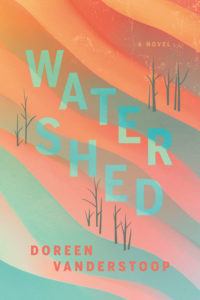By Vincent Potter
Watershed by Doreen Vanderstoop
Freehand Books (2020)
ISBN: 9781988298597
The dystopia in Doreen Vanderstoop’s Watershed is one worryingly reasonable: it’s 2058, no one has enough water, and being a farmer is rough—even rougher than usual. While corporations are looking to pipe out what H2O Alberta has left for a profit, Willa Van Bruggen and her husband are barely keeping their cattle-turned-goat farm alive amidst never-ending dust storms and disease—all while their son Daniel, who betrayed Willa for the city, attempts to make some high-level change. Vanderstoop’s writing is strongest when it centers on Willa, her difficulties understanding her son, her white-knuckle grasp on her late father’s property, and, eventually, her encroaching madness. When it comes to the dystopian setting itself, however, the writing dips into a classic sci-fi mishap: overabundant exposition from characters who narrate like historians.
Take, for example, Daniel’s first scenes walking through the Calgary of 2058. The narrator, in limited third-person perspective, describes everything as Daniel sees it—including street names, the writing on signs, the types of garbage by his feet, the names of the buildings he passes, and etcetera. Or take chapter 6, which begins with “Dan sat down at the back-corner table of the nearly deserted Starbucks at Crowfoot Centre in northwest Calgary.” The back corner might establish Daniel’s character, and the near-empty Starbucks sets the scene and the ambience; the Crowfoot Centre and northwest Calgary, on the other hand, are irrelevant details, especially to a non-Calgarian reader.
In contrasting then Calgary and now Calgary, Watershed strikes for the hearts of real-life inhabitants who know the city’s landmarks themselves. The Palliser hotel, once extravagant, now houses the homeless. The Olympic Plaza, made for winter sports, now sits abandoned and pointless in the dust. The problem with these otherwise-powerful details, however, comes from the delivery. From the perspective of Daniel, the narrator stacks exposition upon the reader in long bursts that interrupt the flow of the plot and seem unjustified coming from a character who would have no reason to take note. In chapter 3, there are 11 references to different streets and locations, most of which are irrelevant to the plot and all of which had no place in the character’s mind at that moment. In chapter 10, the reader gets a full explanation of the current products in Calgary grocers, where they’re from, and why farmers changed from potatoes to less “thirsty” crops—all because Daniel’s landlord looks malnourished.
These issues in Watershed seem to appear most often when the narrator becomes distanced or dishonestly representational of the point-of-view characters. Conversely, moments in which the narrator is closest to the current character is where Watershed succeeds—and where Vanderstoop writes her most efficient lines. In characterizing Willa, Vanderstoop uses clever imagery and metaphors; for example, “Willa strained the bad news from the pile of innocuous facts. Picking nits from a mink, her father would have said.” Later, in the juxtaposition of assisted suicide with the euthanizing of a horse, Vanderstoop weaves desperation in-between the vivid sights and smells in a room full of death. In fact, Vanderstoop excels in near-all moments of literal confinement within the novel: whether it’s the room of a dying man, the office of an inflated executive, or the cell used after the novel’s late thriller twist, these moments of intimacy bring a tender honesty to characters that might otherwise have been left in the dystopian dust.
Watershed is written by a Calgarian for Calgarians. For some, this may be its primary selling point, and such readers will likely be happy with what they find. For others—non-Calgarians or impatient sci-fi fans, especially—the exposition and straying focus may hinder an otherwise tender and honest experience.
Vincent Potter is a Calgarian writer and editor. Since graduating from Mount Royal University’s English program, he fills his time with freelance editing and writing poetry next to his guinea pigs.
